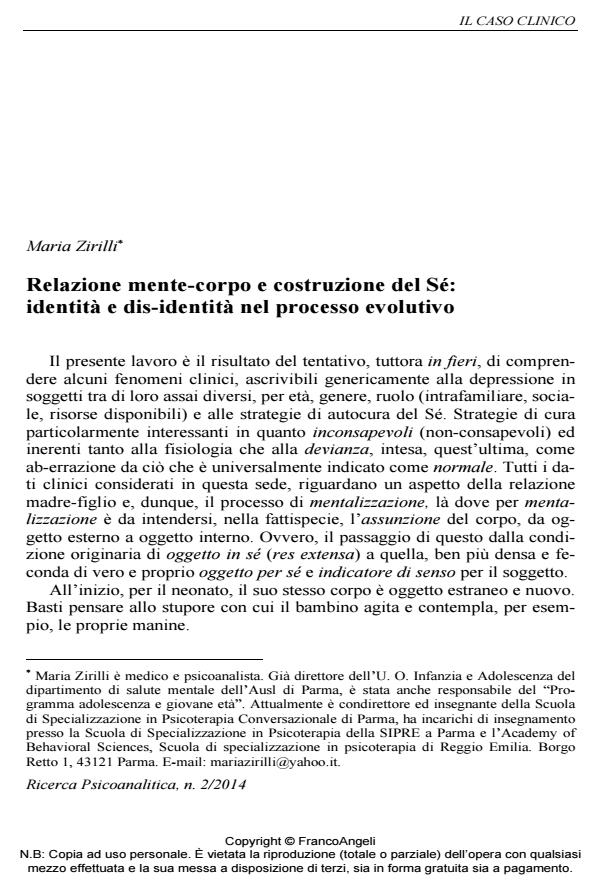The body-mind relationship and the construction of the self: identity and disidentity during development
Journal title RICERCA PSICOANALITICA
Author/s Maria Zirilli
Publishing Year 2014 Issue 2014/2
Language Italian Pages 12 P. 101-112 File size 629 KB
DOI 10.3280/RPR2014-002007
DOI is like a bar code for intellectual property: to have more infomation
click here
Below, you can see the article first page
If you want to buy this article in PDF format, you can do it, following the instructions to buy download credits

FrancoAngeli is member of Publishers International Linking Association, Inc (PILA), a not-for-profit association which run the CrossRef service enabling links to and from online scholarly content.
With the help of a case history considered typical because very near the so-called normality, the author identifies the cause of the patient’s infertility in the failed inclusion of a part of her self. Retracing the twenty year long vicissitudes of an event in the patient’s life, the author highlights the steps for the recognition and inclusion in the self of the dimensions approved by her mother that were indispensable for reaching autonomy and biological fullness. This clinical history proved to be common in a specific social group represented by socially powerful women that show a prevalence of the mental over the biological due to complex reasons among which the so-called feminist culture. [KEY WORDS: infertility, female identity, post-partum, disidentity, dissociation, adoption] 008 Riassunto: L’autrice è partita dal concetto di innato messo in luce nel numero tre di Ricerca Psicoanalitica sull’opera di Stern ed ha approfondito l’utilizzo del concetto all’interno della diatriba tra psicoanalisi e ricerca, mettendo in luce come e perché esso abbia trovato terreno fertile in ambito psicoanalitico. Ha evidenziato quanto Stern e l’infant research abbiano scosso nelle fondamenta le certezze psicoanalitiche con l’infant observation. Infine ha sottolineato che è in corso d’opera una metanoia, un cambiamento epistemico e metodologico che ci spinge a interrogarci sul senso e sull’utilizzo di ogni specifica disciplina per uscire da facili universalismi e per avere uno sguardo sempre più rivolto al particolare, al contestuale e al processuale che può aiutare a evitare facili individualismi.
Keywords: Innatismo, assolutismo, individualismo, filosofia, ricerca, epistemologia, contestuale, processuale, reale]
Maria Zirilli, Relazione mente-corpo e costruzione del Sé: identità e dis-identità nel processo evolutivo in "RICERCA PSICOANALITICA" 2/2014, pp 101-112, DOI: 10.3280/RPR2014-002007